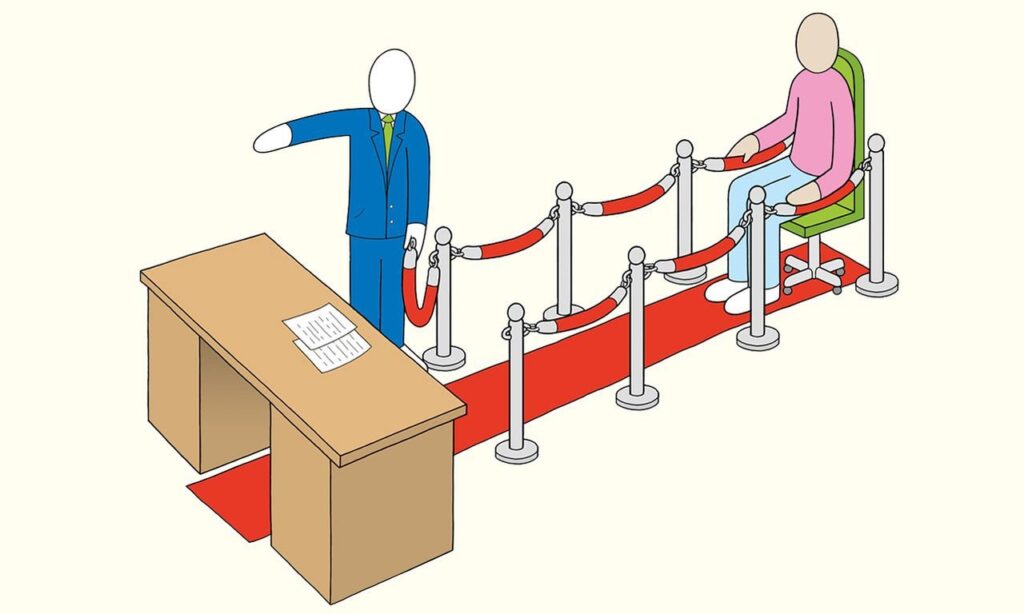Table of contents
Labor market tightness? Fire your 'HR' department
Japke-d. thinks along
Certainly, the labor market is tight. But are employers really doing everything they can to find staff? No, heard Japke-d. Bouma. “Employers who complain about tightness in the labor market, but meanwhile reject older workers, I don’t believe anymore.”

Soon I have to give a talk at a conference for employers. They would like tips on how to still find staff in today’s tight labor market. But I’m pretty nervous about it. Because I fear I don’t have such a positive story for them. And that the problem lies largely with themselves.
Sure, the labor market is historically tight. You’re already hearing about employers who start applying to employees, rather than the other way around.
But then when I hear from readers how lax, old-fashioned, vague and one-sided some other employers still recruit, I think: you could be more ambitious, innovative, creative and above all inclusive, you ‘recruiters’.
Fortunately, I also heard many simple tips on how to do better. If you’re already doing all this, I didn’t say anything – poor employers! – but if not: get off your lazy ass and get to work!
- First of all, fire all your HR personnel
And of course I mean the HR departments where there are only tuts (m/f) who hire only people who look exactly like themselves. More “process” than content, more “skills” than knowledge, and above all, no older than forty – are you crazy, then you’re hiring your father (m/f)! - Instead, hire HR people who get it
Who understand that the right colleagues and the right team are THE differentiating force of your organization. - And delete that term HR – people are not “human resources,” not “human resources,” but people
When those departments were still called human resources, everyone understood that right away and there were no shortages – coincidence? I don’t think so. - Also, stop with all the bullshit like agile, onboarding, employee journey owners, team leads, scrum masters, vibe managers, and story tellers in your job postings and speak normal language!
Then you may not get hip young applicants, but you will get people who know what they are doing and (as a result) stay longer. - Start hiring “older” workers anyway, employers!
The largest cohort in the labor market today is over 50; it is the healthiest generation of 50-plus in history. They are smart people, who have been told all their lives that you have to keep learning and so are surprisingly up-to-date.
So I no longer believe employers who complain about labor shortages but meanwhile reject older workers.
Tight labor market, one reader wrote on LinkedIn, “That’s all scaremongering. Junkies are running out, help, our institution is crashing.” - And look beyond your nose, staff recruiters!
How many offices are there where no one from the target group has ever sat in one of the mandatory disabled toilets, simply because “HR” has never hired a disabled person? - Not to mention people with different skin color
People with lung covid, autism or depression who are currently working below their level, standing along the sidelines or forced to work in a totally different field. People who wear ugly sweaters and/or are more taciturn than you – you can just hire them, too, you know, even if you don’t want to be photographed with them.
“Employers don’t suffer from a tight labor market, they suffer from a tight mindset,” wrote one reader on LinkedIn. “They are employers with a distance from the labor market.” Another wrote: “employers are not struggling to fill vacancies, but DO NOT bother.” - Indeed, IS there actually a tight labor market?
Many job applicants still getghosted – that is utterly ignored – after a job application, I read on LinkedIn. As long as that is still the case, there is little tightness. Seems to me.
Moreover, “it seems that the staff shortage occurs mainly in places where people receive little appreciation, are surrounded by regulatory pressure, have to work idiotic hours and are also poorly paid,” psychologist Thijs Launspach wrote in AD this summer. “So the staff shortage is primarily an appreciation shortage.” - But if you’re going to recruit young people without ‘spots’, really put yourself in their shoes.
Think with them about pregnancies (childcare?), student debt, “meaning” (how green, sustainable and meaningful is our business really?), opportunities to study alongside work, a (cheaper) energy contract and housing.
Otherwise, give them a home in or above your office. Only then do you really bind them to you. Indeed, they cannot leave at all. Open a savings account so their children can study. Or rent some beach houses in Bali so they can “digital nomad” there. Maybe even cheaper, too, next winter. - Stop bureaucracy, regulatory pressure and ‘form terror,’ as one reader called it
So that people can actually engage in the work they are trained to do and love.
Of course, the fact that most young people become self-employed is not only due to the lack of permanent contracts. They just don’t want to keep having unnecessary meetings, filling out time sheets, stand-ups, heath days, and brainstorming over unnecessary vision documents. They have that in common with older people, by the way. - And then becoming a nice company/organization yourself will also help quite a bit
So no more office space, no more flex spaces, no more micromanagers sitting on your neck all day, no more hassle with “challenging roles,” and no more everyone in the cc, performance reviews, heath days (yawn), endless assessments (fuck you) and three layers of approval for when you want sugar in your coffee. - But just, you know…
Computers that work, good coffee, travel expenses, reasonable schedules, vacation days, advancement opportunities, contracts, equal pay for equal work, saying yes or no quickly to new plans, and managers who know something about the process, but most of all appreciate the content. - And, oh yes, give people the choice to work from home!
To schedule their own time, to decide WHERE they work so they have to travel less.
Furthermore, on time something with champagne, bonuses and chocolate fountains (not too often!) and if you also set the heating to 19 degrees soon, you will have to beat off the applicants (who no longer have money to fire at home and do not work in Bali). - Waiting until the next crisis is also possible, of course
Then the staff will automatically come back with hanging feet. But for those who can’t wait for that, there is plenty to do again now.
Good luck with it!

FREE WHITE PAPER
Reduce Total Cost of Ownership (TCO) with the Kraljic Matrix

Free whitepaper
Project Procurement in the Machine Building Sector
Find a buyer through xentys
At xentys, your experienced procurement recruitment agency, we are happy to help you find the right professional for your procurement team. Send a message today and strengthen your purchasing department.
News

What is the meaning of SKU?
A SKU, or Stock Keeping Unit, is a unique code used to identify a specific product that is in stock. This alphanumeric code is indispensable for inventory management and logistics operations, as it allows products to be tracked and managed. SKUs can contain information about a product’s attributes, such as

What is meant by the 80/20 rule?
The 80/20 rule, also known as the Pareto principle, is an economic rule that states that 80% of all results come from 20% of all efforts. This rule was first introduced by Italian economist Vilfredo Pareto, who discovered that 80% of the land in Italy was owned by only 20%

What does 3PL & 4PL mean?
The terms 3PL (Third-Party Logistics) and 4PL (Fourth-Party Logistics) play an important role in supply chain management today. But what exactly do those terms mean? 3PL refers to a logistics service provider that outsources specific logistics functions, such as transportation, warehousing and distribution, to an external party. These service providers

What is a freight forwarder?
A freight forwarder, also known as a forwarding agent, is an essential link in the logistics chain. This party organizes and coordinates the transportation of goods from one location to another. In this context, the necessary means of transportation, such as trucks, ships or aircraft, must be arranged and










